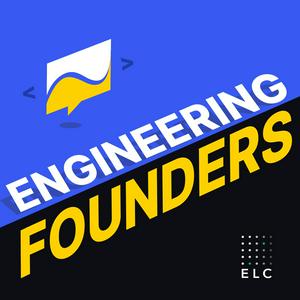Why founders should invest in coaching, communication & leadership mechanisms before you scale w/ James Birchler
Founders often delay leadership coaching until a major crisis hits, leading to significant costs in productivity, team churn, and poor decisions. In this episode, James Birchler (Technical Advisor & Executive Leadership Coach) argues that early coaching is a game-changer for a startup's success. We explore the hidden costs of waiting and the benefits of intentionally installing leadership and communication systems before you scale. James shares specific self-awareness mechanisms, like advisory groups and feedback loops, to help founders design their day and create accountability. You'll also learn practical strategies like the "5-Minute Alignment Loop" for spotting communication breakdowns & for reinforcing clarity. Plus insights on how to "install your leadership OS" so it can scale with your company.ABOUT JAMES BIRCHLERJames Birchler is an executive leadership coach and technical advisor who specializes in helping engineering leaders and founders develop greater self-awareness and build high-performing teams. He combines deep technical expertise with practical leadership development, making him particularly valuable for technical leaders scaling their organizations.As both a founder and engineering leader, James has more than 20 years of experience leading teams at companies ranging from early-stage startups to Amazon, where his current role is Technical Advisor to the VP of Amazon Delivery Routing and Planning. Most recently, he founded NICER, a premium natural personal care company, and Actuate Partners, his executive coaching and technical advisory practice. He also held VP of Engineering roles at companies including Caffeine (backed by Greylock and Andreessen Horowitz), SmugMug (where his team acquired Flickr), and IMVU.At IMVU, James implemented the Lean Startup methodologies alongside Eric Ries, author of The Lean Startup and creator of the methodology, literally the first company to apply these principles. His team helped pioneer the DevOps movement by building infrastructure to ship code to production 50 times per day and coining the term "continuous deployment." This experience in systematic experimentation and continuous improvement now informs his coaching approach through frameworks like CAMS (Coaching, Advising, Mentoring, Supporting) and the Think-Do-Learn Loop.James completed his executive coaching certification at UC Berkeley Haas School of Business Executive Coaching Institute. His coaching practice focuses on self-awareness, integrity, accountability, and fostering growth mindsets that support continuous learning and high performance. He writes the Continuous Growth newsletter and offers both individual executive coaching and peer learning circles for technical leaders.Through his advisory work with growth-stage startups in the US and Europe, James helps leaders navigate common scaling challenges including hiring and interviewing, implementing development methodologies, establishing operational cadences, and developing other leaders. His approach treats leadership development like product development—with systematic feedback loops, measurable outcomes, and continuous improvement.You can find James at jamesbirchler.com, LinkedIn, and Substack. ToolHive Unlocks the Full Value of MCP & Your AI AgentsSo you’ve invested in AI agents for code generation, but they’re limited to experiments or even stuck on the shelf. To do real, valuable work, those AI agents need access to your data and systems.ToolHive helps you confidently connect the pieces by making it simple and secure for you to use the Model Context Protocol (MCP).ToolHive includes a pre-vetted registry of MCP servers, containerizes every MCP server for consistency and leans on built-in security to keep your secrets safe.Leaders trust ToolHive to put MCP into production and put their AI agents to work.ToolHive is open source, so get started for free at toolhive.dev Join us at ELC Annual 2025ELC Annual is the premier event for engineering leaders. This is our biggest event of the year: 1,000+ CTOs, VPs & Directors in San Francisco @ ELC Annual 2025 for two days of leadership breakthroughs, tactical peer learning & curated connections!🔗 Get your ticket now → https://sfelc.com/annual2025 SHOW NOTES:Why founders should seek coaching earlier rather than waiting for a crisis to occur (2:47)The high stakes of ignoring this critical advice & how this leads to communication & Scaling problems (4:50)The importance of effective communication channels & leadership mechanisms before pressure increases (6:31)How investing a small amount in coaching early on can prevent hundreds of thousands of dollars in future costs (8:07)Frameworks for cultivating self-awareness / leadership blind spots (11:06)James's practice of "designing your day" around a desired identity, not just a list of tasks (12:30)Why designing your day is about intentionality (15:13)How this practice leads to better relationships & opportunities to reflect (17:44)Reflective listening & its impact on customer relationships (19:32)Strategies for improving self-awareness / uncovering blind spots (22:05)An example of how awareness can lead to better results (26:03)Day-to-day rituals for improving self-awareness (28:14)Signals that your communication methods are effective & getting through (30:36)Reflect on & define the desired outcome you want to generate (33:26)The five-minute alignment loop for creating clarity & confirming ownership as a leader (35:21)Why creating clarity & finding alignment is key as a founder (37:01)How the same communication & leadership patterns recur as your org scales, from small startup to large enterprise (39:46)The increasing importance of human skills like emotional intelligence and reflective listening in an age of AI (42:03)Rapid fire questions (44:38)This episode wouldn’t have been possible without the help of our incredible production team:Patrick Gallagher - Producer & Co-HostJerry Li - Co-HostNoah Olberding - Associate Producer, Audio & Video Editor https://www.linkedin.com/in/noah-olberding/Dan Overheim - Audio Engineer, Dan’s also an avid 3D printer - https://www.bnd3d.com/Ellie Coggins Angus - Copywriter, Check out her other work at https://elliecoggins.com/about/


